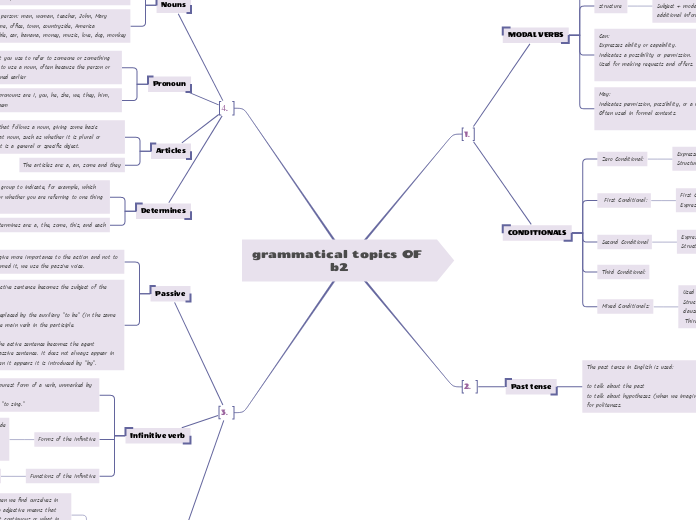grammatical topics OF b2
ING TERMINATION
Examples: John Is Reading A Book - John is reading a book.
Verbs in English that end up in «ing» when we find ourselves in English ending in -ing and do not refer to adjective means that they are a verb: we talk about the present continuous or what in Spanish would be.
Infinitive verb
Functions of the Infinitive
As a Noun
Forms of the Infinitive
To + Base Form: The most common form in English. Used in a wide range of contexts. Bare Infinitive: Used after modal verbs (can, could, should, etc.) and in certain other cases.
Definition: The infinitive is the purest form of a verb, unmarked by tense, person, or number.
Examples: "to read," "to write," "to sing."
Passive
1. The object of the active sentence becomes the subject of the passive sentence.
2. The main verb is replaced by the auxiliary "to be" (in the same tense) followed by the main verb in the participle.
3. The subject of the active sentence becomes the agent complement of the passive sentence. It does not always appear in the sentence, and when it appears it is introduced by "by".
Is when we want to give more importance to the action and not to the person who performed it, we use the passive voice.
Estructure:
Subject + auxiliary verb (to be) + past participle…
Determines
Determines are: a, the, some, this, and each
Is the beginning of a noun group to indicate, for example, which thing you are referring to or whether you are referring to one thing or several
Articles
The articles are: a, an, some and they
An article is a word that follows a noun, giving some basic information about that noun, such as whether it is plural or singular, or whether it is a general or specific object.
Pronoun
example The personal pronouns are I, you, he, she, we, they, him, her, he, she, us and them
pronoun is a word that you use to refer to someone or something when you do not need to use a noun, often because the person or thing has been mentioned earlier
Nouns
examples person: man, woman, teacher, John, Mary
place: home, office, town, countryside, America
thing: table, car, banana, money, music, love, dog, monkey
A noun is a word that names something, such as a person, place, thing, or idea. In a sentence, nouns can play the role of subject, direct object, indirect object, subject complement, object complement, appositive, or modifier
Past tense
The past tense in English is used:
to talk about the past
to talk about hypotheses (when we imagine something)
for politeness.
Past perfect continuous:
I had been working
Past perfect:
I had worked
Past continuous:
I was working
Past simple
I worked

